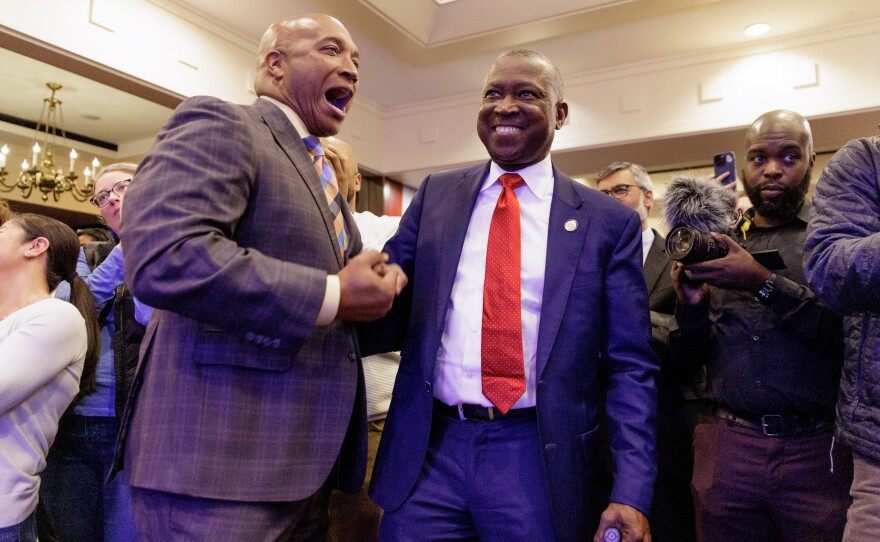Virginia voters chose to further Democrats’ control of the General Assembly on Tuesday, according to the Associated Press, likely dooming broad swaths of Gov. Glenn Youngkin’s agenda for the remainder of his term.
At an election watch party in Richmond Tuesday night, Senate caucus chair Mamie Locke (D–Hampton) and vice chair Scott Surovell (D–Fairfax) drove the point home by holding aloft a pair of blue bricks — a play on the figurative “brick wall” they planned on erecting to prevent GOP policies on issues like abortion from reaching Youngkin’s desk.
The top Democrat in the House, Del. Don Scott (D–Portsmouth), marked the possibility of becoming the first Black speaker in that chamber.
“Tomorrow is the first day of a new Virginia — a more welcoming Virginia, a more inclusive Virginia,” Scott said.
Democrats held at least a one-seat majority in the Senate and the House with a few races yet to be called. All results remain unofficial until they’re certified by the state.
Dave Rexrode, chair of Youngkin’s Spirit of Virginia PAC, said on the social media platform X that the team was monitoring a “couple key races” and would assess the outcomes fully on Wednesday morning.
“We had hoped for a stronger outcome this evening but are proud of the effort all of our candidates put in to these extremely competitive districts,” Rexrode said.
Republicans, led by Youngkin, leaned on themes from the governor’s successful 2021 campaign: lowering taxes, decreased regulation and the parents’ rights movement centered on conservative viewpoints on topics related to gender and race in the classroom.
Youngkin and most Republican candidates also unified behind a proposed 15-week abortion restriction, with exceptions for rape, incest and if a pregnant person’s life is in danger.
But Democratic candidates argued the GOP couldn’t be trusted on the topic in the wake of the U.S. Supreme Court’s overturning of Roe v. Wade last year. They noted that while some candidates said they supported Youngkin’s 15-week restriction, several were caught on tape supporting more stringent policies.
“Instead of extremism and culture wars, people voted for common sense leadership and problem solvers,” said Susan Swecker, chair of the Democratic Party of Virginia.
Democrats overcame low approval ratings for President Joe Biden, who won Virginia by 10% in 2020 but had a 41% approval rating in a recent poll by Christopher Newport University. The same poll found 55% of those surveyed approved of Youngkin.
For the first time in recent history — if not Virginia history — lawmakers ran in districts created entirely by an outside entity. The new maps were drawn by two independent experts appointed by the Supreme Court of Virginia after a redistricting committee, which was approved by voters in 2020, failed to find consensus. The experts’ maps gave Democrats a slight edge based on the partisan results of the baseline — the 2017 attorney general’s race Democrats won by about 6.5%.
The map-makers decision to ignore incumbents' home addresses led to a slew of retirements and a record number of incumbents who lost state Senate primaries.
Virginia currently allows abortions through the second trimester and with rare exceptions beyond that. That makes it the only state in the South that has not implemented restrictions since SCOTUS’ 2022 Dobbs v. Jackson Women's Health Organization decision.
Youngkin proved to be a prolific fundraiser throughout the campaign, but Democratic candidates held a nearly $10 million fundraising advantage through Oct. 26, according to an analysis from the Virginia Public Access Project.
In all, Virginia’s legislative candidates raised nearly $175 million this election cycle, according to an analysis from WHRO News and the nonprofit watchdog OpenSecrets — up from an inflation-adjusted total of around $135 million in 2019.
Additional reporting by Jahd Khalil.



